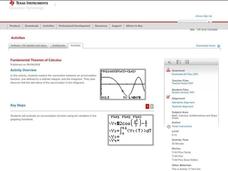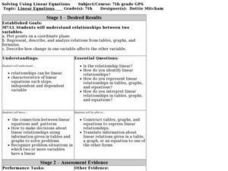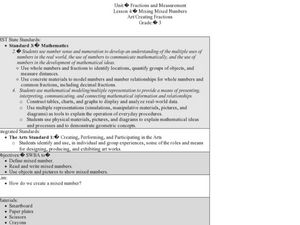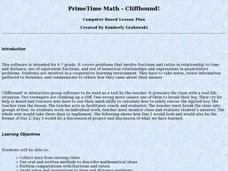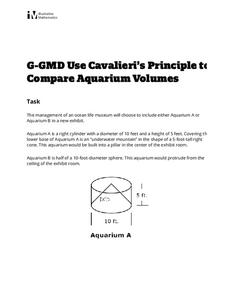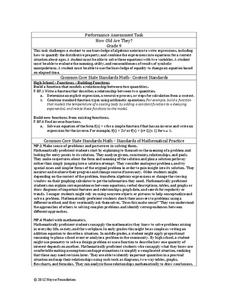Curated OER
Reciipes Made for More
Middle schoolers write recipes. In this recipe lesson, students double and triple recipes. They perform calculations with fractions, whole numbers and mixed numbers. They explore cooking websites to find their favorite...
Curated OER
Fundamental Theorem of Calculus
High schoolers, with the assistance of their TI-84 Plus / TI-83 Plus calculators, explore and assess the connections between an accumulation function, one defined by a definite integral, and the integrand. They summarize that the...
Curated OER
Optimization
Learners identify the critical points to a function. In this calculus lesson, young scholars perform optimization of functions. They use the TI to create a visual of the graph.
Curated OER
Solving Using Linear Equations
Seventh graders explore linear equations. They observe the relationship between linear equations an patterns. Students make decisions using information given in graphs to solve linear equations. They perform a toothpick activity to...
Curated OER
NJ HSPA Cluster 4
Pupils engage in a instructional activity that is focused upon helping them to complete exercises used to prepare for the High School Proficiency Assessment. They look at the patterns seen in algebraic problems and focus upon the cluster...
Curated OER
Linear Equations
Seventh graders explore battle plans using grids. In this linear equation lesson, 7th graders see how math is used in battle. Students create a grid on the floor using tape and plastic army men to serve as the points. Students...
Curated OER
Mixing Mixed Numbers Art/Creating Fractions
Third graders explore number values by participating in class math activities. In this fractions lesson, 3rd graders collaborate with classmates to discuss the technique of adding mix numbers while utilizing paper plates to help...
Curated OER
Hamburger Lesson
Students examine fractions in this lesson. They practice with how to reduce and perform operations on fractions.
Helping with Math
Multiplication: 2-digit x 2-digit
Number crunchers sharpen their math skills as they solve 30 problems requiring them to multiply two-digit numbers by two-digit numbers. Assign this as homework or use it as an assessment after practicing the skill together in class.
Curated OER
Simplify Expression Using the Order of Operations
Allow learners to explore both the right and wrong way of completing equations with the order of operations. They discuss how the order in which operations are performed affects the outcome of a problem. A fun "trick" using order of...
Curated OER
Linear and Locomotor Movements
Students develop locomotor movements. In this dance movement lesson, students identify lines and develop creativity while performing to "Cha Cha Slide". Students discuss how to create dances and difficulty of movements.
Curated OER
Assessing Normalcy
Learners define normal distribution as it relates to the bell curve. In this statistics lesson plan, students use the central tendencies of mean, median and mode to solve problems. They plot their data and draw conclusion from the graphs.
Curated OER
Assessing the quality of habitat for Monarch Butterflies
Students use different sampling methods to determine the population size and appropriate space for monarch butterflies. In this averages lesson plan, students complete word problems where they can accurately estimate the size of an...
Curated OER
PrimeTime Math: Cliffbound!
Students are involved in a cooperative learning environment that analyzes fractions, ratios to time and distance, equivalent fractions and numerical relationships and expressions in quantitative problems. They take notes, relate...
Balanced Assessment
Alcohol Level
How long does it take alcohol to leave your system? Individuals explore this question by examining a polynomial function. They draw conclusions by analyzing the key features of the given polynomial function.
Balanced Assessment
Survey Says
Examine statistical data that shows an overlap in responses. The data tallies over 100% and learners interpret this data characteristic. They then create a graph to represent the data.
Illustrative Mathematics
Use Cavalieri’s Principle to Compare Aquarium Volumes
Learners are designing a stunning new water feature for an aquarium, but they soon discover that more than just a pretty home for their fishy friends is required. From calculating the volume of a composite shape through the...
Mary Pope Osborne, Classroom Adventures Program
Mummies in the Morning Egyptian pyramids, hieroglyphics
Visit the Magic Treehouse and take your class on a trip through time with a reading of the children's book Mummies in the Morning. Using the story to spark an investigation into Egyptian culture, this literature unit engages...
Curated OER
A Trip to Colonial Virginia
Students consider prices while planning a trip to Colonial Virginia. In this budgeting lesson, students construct an itinerary of events for a vacation. Students are responsible for working within the approved budget.
Inside Mathematics
Quadratic (2006)
Most problems can be solved using more than one method. A worksheet includes just nine questions but many more ways to solve each. Scholars must graph, solve, and justify quadratic problems.
Inside Mathematics
Graphs (2006)
When told to describe a line, do your pupils list its color, length, and which side is high or low? Use a learning exercise that engages scholars to properly label line graphs. It then requests two applied reasoning answers.
Inside Mathematics
How Old Are They?
Here is a (great) lesson on using parentheses! The task requires the expression of ages using algebraic expressions, including the distributive property. Pupils use their expressions to determine the individual ages.
Inside Mathematics
Quadratic (2009)
Functions require an input in order to get an output, which explains why the answer always has at least two parts. After only three multi-part questions, the teacher can analyze pupils' strengths and weaknesses when it comes to...
Curated OER
The Number Line
Represent, order, and compare rational numbers in order to practice placing them on a number line. Your class will use appropriate operations, methods, and tools to compute with real numbers. Then they must explain completely and clearly...



